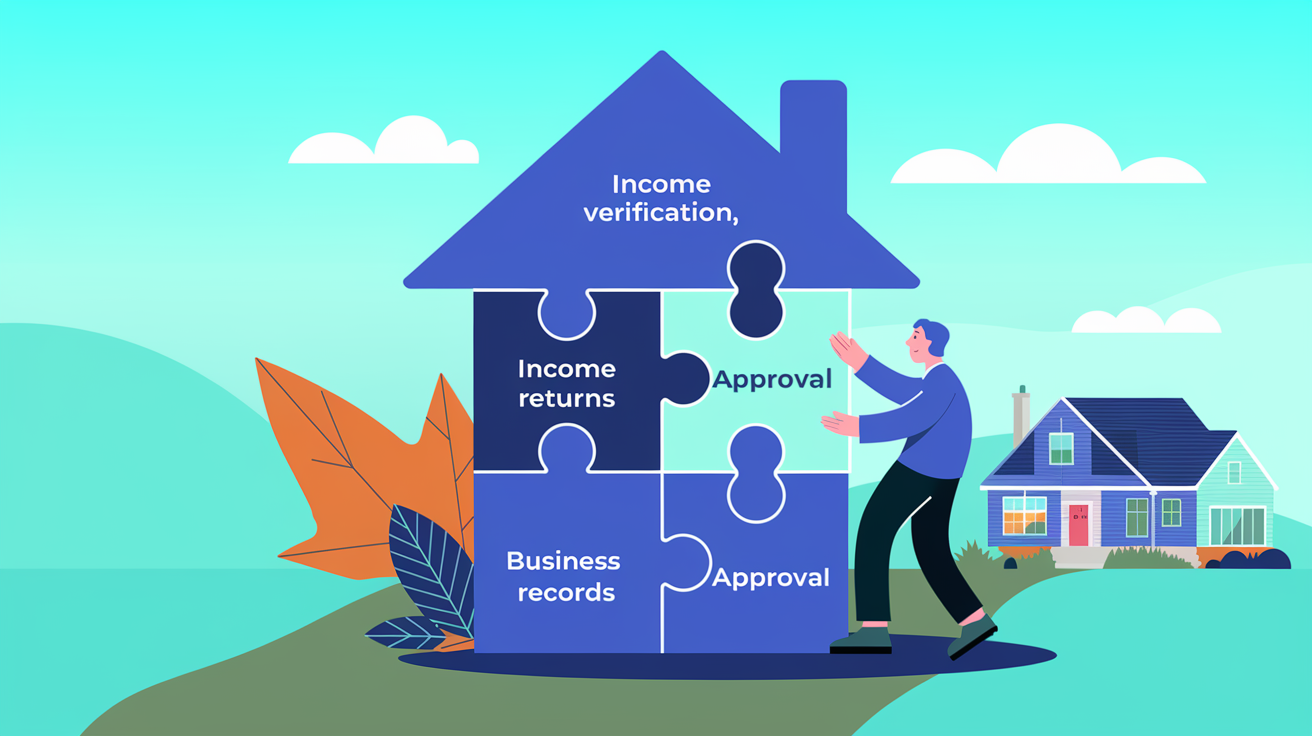Table of Contents
The self employed mortgage in Canada – There are 2.7 million self employed workers in Canada, representing 13.2% of the employed population, according to Statistics Canada. For the millions of self-employed Canadians, owning a home is a significant milestone. However, securing a mortgage can feel like climbing up a steep mountain than traditional home loans because they face unique challenges when proving income stability and financial reliability. However, with the right knowledge and preparation, obtaining a self-employed mortgage is entirely possible. This guide provides an in-depth look at what you need to know, including requirements, options, and tips to navigate the process. This guide will walk you through everything you need to know about self-employed mortgages, including self employed mortgage requirements, options, and tips to improve your chances of approval.
What Is a Self Employed Mortgage?
A self employed mortgage is a home loan designed for individuals who work for themselves rather than being employed by a company. Unlike traditional borrowers who provide T4 slips as proof of income, self-employed individuals must rely on alternative documentation to verify their income.
Is It Harder to Get a Home Loan than Being Self-Employed?
With millions of income earners in Canada being self-employed (at least part-time), we often wonder why it is harder to get a home loan being self-employed. The first issue is the fact that income is not always easy to prove because revenue may fluctuate. Also, many business owners are motivated to expense as much as possible in order to minimize their taxes payable, which is something many lenders do not recognize.
Lenders often view self employed mortgages as high risk because they’re unsure of whether the self-employed worker will be able to pay back the loan. That’s why lenders require alternative documentation to assess financial stability and repayment ability.
How Do I Qualify for a Self Employed Mortgage?
To secure a self employed mortgage, the banks need to make sure you can afford the payments. Most lenders require that personal tax Notices of Assessment from the past 2-3 years be included with the mortgage application. If you can provide one, then you can generally access the same mortgage products and rates as traditional borrowers. But, if you can’t provide this proof of income, then you need to at least have a good credit history and provide a minimum down payment of 10%.
Other than your Notices of Assessment, some of the other supporting documentation a lender may require for a self-employed mortgage application in Canada includes:
- Proof of Income:
- T1 Generals (complete tax returns).
- Business financial statements (if incorporated).
- Bank statements showing consistent deposits.
- Credit Score:
- A minimum credit score of 600 is usually required, but higher scores improve your chances of approval and better rates.
- Down Payment:
- A minimum down payment of 5% for homes under $500,000 and 10% for amounts exceeding $500,000.
- Debt Ratios:
- Gross Debt Service (GDS) ratio below 39%.
- Total Debt Service (TDS) ratio below 44%.
- Business Documentation:
- Business license or articles of incorporation.
- Proof of HST/GST payments.
- Contracts showing future revenue.
Is It Harder to Get a Home Loan Being Self-Employed?
Unfortunately, getting a self-employed home loan can be more challenging because of stricter income verification requirements. Many self-employed individuals write off expenses to reduce taxable income, which can make it harder to qualify under traditional lending criteria. However, specialized programs like bank statement loans and stated income mortgages simplify the process by focusing on cash flow rather than declared income.
What Is a Bank Statement Loan for Self-Employed Borrowers?
A bank statement loan is an alternative mortgage option that allows self-employed individuals to qualify based on their business’s cash flow rather than taxable income. Borrowers provide six months or more of business bank statements to demonstrate consistent deposits and financial stability.
Benefits:
- No need for NOAs or T1 Generals.
- Ideal for those with significant tax write-offs.
- Flexible qualification criteria.
How Many Years of Income Do You Need for a Self Employed Mortgage?
Most lenders require at least two years of verifiable income through NOAs or bank statements. However, some programs cater to recently self-employed individuals with less than two years in business if they can demonstrate:
- Predictable earnings.
- Sufficient cash reserves.
- Relevant work experience or education in their field.
Can Self-Employed Get an FHA Loan in Canada?
In Canada, there is no equivalent to the U.S.-based FHA loan program. However, self-employed borrowers can access insured mortgages through providers like CMHC, Sagen, or Canada Guaranty. These programs allow borrowers with limited proof of income to qualify with as little as 10% down if they meet other criteria.
What Credit Score Do I Need for a Self Employed Mortgage?
A credit score of at least 600 is the minimum requirement for most lenders offering self-employed mortgages in Canada. Higher scores (700+) increase your chances of approval and access to lower interest rates.
How Do Lenders Calculate Income for a Self-Employed Mortgage?
Lenders calculate income based on the average net income reported on your NOAs over the past two years. If you use tax write-offs extensively, this could lower your qualifying amount. For those without verifiable income, stated income or bank statement programs may be used instead.
What Are the Best Mortgage Options for Self-Employed Individuals?
Self-employed borrowers in Canada have several mortgage options:
- Traditional Mortgages:
- For those with verifiable income through NOAs and T1 Generals.
- Bank Statement Loans:
- Based on cash flow rather than taxable income.
- Stated Income Mortgages:
- Allows you to state your income without extensive documentation but may come with higher interest rates.
- Private Mortgages:
- Flexible qualification criteria but higher interest rates and fees.
- CMHC Insured Mortgages:
- Requires at least 10% down payment and proof of stable business operations.
How Does Being Self-Employed Affect My Mortgage Interest Rate?
Being self-employed does not automatically result in higher interest rates if you meet all lender requirements. However, borrowers using stated income or private mortgage options may face slightly higher rates due to perceived risk.
Tips to Secure Better Rates:
- Maintain a high credit score.
- Provide comprehensive documentation.
- Work with a mortgage broker specializing in self-employed mortgages.
Conclusion
Securing a self-employed mortgage in Canada requires preparation and understanding of lender expectations. While the process may seem daunting, numerous options—such as bank statement loans and stated income programs—are available to help you achieve homeownership. By maintaining strong financial records, improving your credit score, and working with experienced professionals, you can navigate the path toward owning your dream home while working self-employed.
Watch our Masterclass on Choosing The Right Mortgage

FAQs
1. Is it harder to get a home loan being self-employed?
Yes, but it’s doable. Lenders see self-employed income as less stable, so they require more proof of financial stability.
2. How do I qualify for a self-employed mortgage?
Show strong, consistent income, a good credit score, and a low debt-to-income ratio. A solid business track record helps too.
3. What documents are required for a self-employed mortgage?
Typically, you’ll need two years of tax returns, Notice of Assessments, bank statements, business financials, and proof of consistent income.
4. What credit score do I need for a self-employed mortgage?
A score of at least 620 is typically required, but 680+ will get you better rates.
5. How many years of income do you need for a self-employed mortgage?
Most lenders require two years of self-employment income, but some alternative lenders accept less with strong financials.
6. How do lenders calculate income for self-employed mortgages?
They average your last two years of income from tax returns or use bank statements for non-traditional loans. Deductions can lower your qualifying income.
7. What is a bank statement loan for self-employed borrowers?
Instead of tax returns, lenders use 12-24 months of bank statements to verify income, making it a good option for those with high write-offs.
8. What are the best mortgage options for self-employed individuals?
Traditional mortgages, stated income loans, bank statement loans, and private lenders are popular options. Best choice depends on income stability and credit.
9. How does being self-employed affect my mortgage interest rate?
Rates may be slightly higher due to income variability, but a strong credit score and financials can help secure competitive rates.
10. Can self-employed individuals get an FHA loan?
FHA loans are only available in the U.S., not Canada. In Canada, self-employed borrowers can explore CMHC-insured loans instead.
